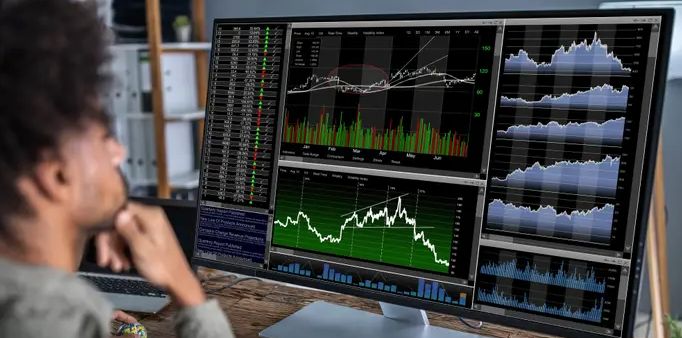This article will teach you 16 simple tips to learn how to day trade
Learning how to day trade – 16 tips for becoming a successful day trader
by Milan Tomic | Associate Staff Writer | Eternal Affairs Media
I have heard that many people want to learn how to day trade, and either do not know where to start or have no one to tell them exactly how to do it. This article will teach you 16 simple tips to learn how to day trade.
For many aspiring investors, day trading is the ideal career path. What more could you ask for when you can work several hours a day while wearing your pajamas, live anywhere there is WiFi, and retire before you turn 30?
The reality, sadly, is a little less attractive. First of all, day trading calls for two abilities that, regardless of the endeavor, the majority of people find difficult to master: practice and work ethic. The majority of day traders lose money, and it is a risky endeavor.
A few initial home runs won’t make you a profitable day trader. You also won’t succeed as a day trader if you chase after every popular stock like a cat that spots a mouse at three in the morning.
The act of purchasing and selling a financial asset on the same day, or even several times throughout the day, is known as “day trading.” If done properly, taking advantage of slight price changes can be a profitable game. However, it can be risky for novices and anybody else who doesn’t follow a very well-made plan.
Learning how to day trade should not be a problem if you decide to follow the right guide.
In this article, we will cover:
- Trade with money you can afford to lose
- Don’t leave your 9-to-5 job
- Start small
- Before the trade, you need to have a plan
- Have Complete Trust in Your Trading Strategy
- Follow the plan no matter what
- Learn to wait
- Don’t worry about the trades you missed
- Understand the power of knowledge
- Sometimes having too much information is not a good thing
- Set a maximum Stop Loss
- Have realistic profit goals
- Make no emotional trades
- Timing is the key
- Learn to lose
- Choose the best broker for you
1. Trade with money you can afford to lose
If you wanted to learn how to day trade but had no upfront budget, you should know that some amount of capital is needed for you to start making money with day trading.
It’s critical to set some money aside specifically for day trading. Never trade more than that or use rent or mortgage funds. Why? You may manage to lose it all.
Determine the capital you’re ready to risk in each trade and make a commitment to it. Many wealthy day traders place trades with a risk of 1% to 2% or less of their account balance.
Set aside a surplus of money that you can trade with but are willing to lose.
2. Don’t leave your 9-to-5 job
If the market is experiencing a prolonged bull run, you might experience a lucky streak. However, before stepping up your efforts, you should first see how your trading plan holds up in challenging market conditions, particularly during a recession. When you start to consistently turn a profit, decide if you want to invest more time in trading.
3. Start small
You will make a lot of mistakes and end up losing money day trading, especially in the beginning. Until you gain enough experience, keep losses under special control.
As a beginner, limit your attention to no more than one or two stocks at a time. With fewer stocks, it is simpler to track and identify opportunities. Trading fractional shares have grown increasingly popular recently. This gives you the option to invest smaller sums of money.
As a result, many brokers now allow you to buy a fractional share for as little as $10, or less than 2% of a full share if shares are currently trading at $2,500.
4. Before the trade, you need to have a plan
Before making any trades in day trading, careful planning is necessary. What standards are you seeking today? What tactics are you attempting to use? How unpredictable is the market?
You are not a day trader if you jump into the market without having a strategy in place. Ensure you have a comprehensive game plan in place before engaging in a trade. Although we have no control over the markets, we can reduce risk by having a strategy for responding to various situations.
5. Have complete trust in your trading strategy.
Don’t start doubting yourself if you develop a comprehensive trading strategy. Keep in mind the previously mentioned advice and follow it. It’s easy to begin doubting yourself as your emotions begin to influence your work, but doing so is counterproductive. Be confident in your strategy.
It’s okay if a great plan doesn’t always lead to a successful trade. The plan includes that. Excellent plans predict both success and failure. To assess the viability of your strategy, you may have to reconsider your planning procedure if you are not confident in your trading plan.
6. Follow the plan no matter what
Stick to your plan once you’ve made it.
While successful traders must move quickly, they do not need to think quickly. Why? They have the patience to stick to their trading strategy because they have developed it in advance. It’s crucial to strictly adhere to your formula rather than try to chase gains. Keep your cool and don’t let your feelings cause you to change your course.
Regardless of whether you make money or lose money, you know precisely when you are going to sell. The job is finished.
7. Learn to wait
Your time and awareness are needed for day trading. You’ll have to sacrifice the majority of your day. If you only have a short amount of time, don’t think about starting day trading.
A trader who engages in day trading must monitor the markets and look for opportunities that might present themselves at any time during trading hours. The key is to move quickly and with awareness.
The quantity of trades a trader makes does not factor into how much they are paid. The performance of your trades directly affects your profit. Do not trade solely for trading. Discover the best opportunities and seize them. No possibilities? Wait. Just like that. No trade is preferable to a bad trade.
8. Don’t worry about the trades you missed
Day traders are future-oriented. You earn money by making predictions about what will happen rather than what has already occurred. Don’t start second-guessing your actions after watching a trade unfold.
For instance, you might start a position for $5 with a $10 profit objective. You sell at $10 for a $5 gain and watch the stock rise to $15 as you do so. You start to regret all the money you may have earned, and as a result, you may now make poor trading decisions in the future.
Stay away from old trades. It is your responsibility to plan a deal, carry it out, and then carry on to the next. Use previous data to inform your strategy, but avoid obsessing over the potential outcomes of a deal.
9. Understand the power of knowledge
Day traders need to be up to date on the most current stock market news and developments that have an impact on stocks in addition to being familiar with day trading methods. This can include announcements about leading indicators, interest rate plans from the Federal Reserve System, and other economic, commercial, and financial news.
Do your research, then. Create a list of the stocks you want to trade. Keep yourself up to date on the chosen firms, their equities, and the market as a whole. Examine business news and bookmark reputable websites for news.
10. Sometimes having too much information is not a good thing
Although traders should be knowledgeable, having too much information might be counterproductive. The same is true of non-technical trading influences. Have you previously seen a trader display a chart that has a large number of technical indicators? How do they decide what to do?
Usually, they get stuck with so much information. If you think about too many possibilities, you’ll become overwhelmed and reach a dead end. Pay attention to the data that will help you make decisions. Great trading strategies facilitate decision-making rather than complicate it.
11. Set a Maximum Stop Loss
Most trade management-related issues can be resolved with proper preparation. However, traders are also human beings, and human beings make mistakes. Even some of the most disciplined traders have occasionally deviated from a plan. What should you do if you ignore a stop loss and end up in a deep loss?
Determine a maximum dollar stop loss and close positions whenever it is reached. This figure should be painful but allow you to continue trading the next day.
You may set a maximum risk of $3,000 if, for instance, your normal risk on a trade is $500. You now have an unbreakable trade rule. If you ever get behind on $3,000, you immediately sell. Avoid justifications! It stings to activate your dollar-limit stop loss, but the alternative is much worse. Nobody intends to destabilize their trading account. They simply allowed a terrible loss to spiral out of control.
12. Have realistic profit goals
To be profitable, a strategy does not need to be successful every time. Only 40% to 50% of the trades that successful traders execute are likely to be profitable. They gain more from their wins than they do from their losses, though. Make certain that the financial risk associated with each trade is restricted to a predetermined portion of your portfolio and that the entry and exit strategies are well-defined.
13. Make no emotional trades
Emotion is one of the main differences between preparing and carrying out a trade. An idea is a plan. Execution is extremely real. Because of this, paper trading is far simpler than trading with actual money. Because the risks are so tiny, there are no feelings involved in theoretical trading. Real trading involves emotions, which surface as you observe changes in your bank account.
How can this be overcome? with careful preparation. Make strategies that you can carry out. Can you bear a $1,500 loss, for instance, if you purchase a share of stock at $7,500 with a stop loss set at $6,000? If not, you should come up with a more practical strategy.
14. Timing is the key
When your plan is ready, all that is left to do is carry it out. After all, one of the most essential things for carrying out a plan is timing, and perseverance is required if you want to succeed. The wrong timing might sabotage a good plan. A plan is meaningless if you enter a position too early or too late. Price volatility is a result of the large number of orders made by traders and investors that start to execute as soon as the markets open in the morning. At the open, an experienced trader might be able to spot patterns and place time orders to profit. But for newcomers, it may be preferable to observe the market for the first 20 to 30 minutes before acting.
Typically, the middle of the day is less unpredictable. Then, as the closing bell approaches, activity starts to build back up. Although possibilities can be found during rush hours, it’s safer for newbies to steer clear of them at first.
15. Learn to lose
The stock market can occasionally make you nervous. You must learn to control your hunger, optimism, and anxiety as a day trader. Decisions ought to be made based on reason, not emotion.
The best traders aren’t always correct. In actuality, most profitable traders experience recurrent losses. Trading includes some losses. Embrace it. Never being right is not a requirement for successful trading. Maximizing earnings on winning trades and limiting losses on losing trades are key components of successful trading.
Make it a habit to accept defeat as a necessary component of the game. Losses are merely a necessary part of running a business.
16. Choose the best broker for you
Due to the significant number of transactions that are made in a single day, choose your broker wisely, as this type of trading frequently carries higher fees.
Keep in mind that all of these tips on learning how to day trade are important, but in day trading by far the most important thing is experience. So start now!











